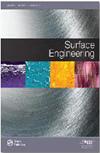利用放电辅助无中心车削对圆柱形植入物进行表面改性
IF 2.6
4区 材料科学
Q3 MATERIALS SCIENCE, COATINGS & FILMS
引用次数: 2
摘要
钛合金的表面改性采用了多种技术。本研究使用放电辅助无心车削(EDCLT)对用于牙科植入物的钛合金表面进行改性。实验按照L9田口正交阵列设计进行。选择脉冲电流(IP)、脉冲接通时间(Ton)和脉冲断开时间(Toff)作为输入变量,表面粗糙度和硬度作为输出变量。机械加工表面的平均表面粗糙度(Ra)小于1.90 µm。与未加工表面相比,加工表面具有更好的耐腐蚀性和生物活性。机加工表面的平均硬度为43.1 HRC至52.8 HRC,而未机加工表面具有42.7 HRC的平均硬度。平均表面粗糙度(Ra)为1.25的机械加工件 与其他表面粗糙度相比,µm的骨矿化度最高。本文章由计算机程序翻译,如有差异,请以英文原文为准。
Surface modification of cylindrical implants using electric discharge-assisted centreless turning
ABSTRACT Numerous techniques are used for the surface modification of titanium alloy. This research uses electric discharge-assisted centreless turning (EDCLT) to modify the titanium alloy surfaces used for dental implants. Experimentations were planned according to the L9 Taguchi orthogonal array design. Impulse current (IP), Pulse on time (Ton), and pulse off time (Toff) were selected as input variables, and surface roughness and hardness as output variables. The machined surface’s average surface roughness (Ra) was less than 1.90 µm. In contrast to unmachined surfaces, the machined surfaces had improved corrosion resistance and bioactivity. The average hardness of machining surfaces was found to be from 43.1 HRC to 52.8 HRC, while unmachined surfaces had an average hardness of 42.7 HRC. The machined piece with an average surface roughness (Ra) of 1.25 µm got the highest bone mineralization compared to other surface roughness.
求助全文
通过发布文献求助,成功后即可免费获取论文全文。
去求助
来源期刊

Surface Engineering
工程技术-材料科学:膜
CiteScore
5.60
自引率
14.30%
发文量
51
审稿时长
2.3 months
期刊介绍:
Surface Engineering provides a forum for the publication of refereed material on both the theory and practice of this important enabling technology, embracing science, technology and engineering. Coverage includes design, surface modification technologies and process control, and the characterisation and properties of the final system or component, including quality control and non-destructive examination.
 求助内容:
求助内容: 应助结果提醒方式:
应助结果提醒方式:


